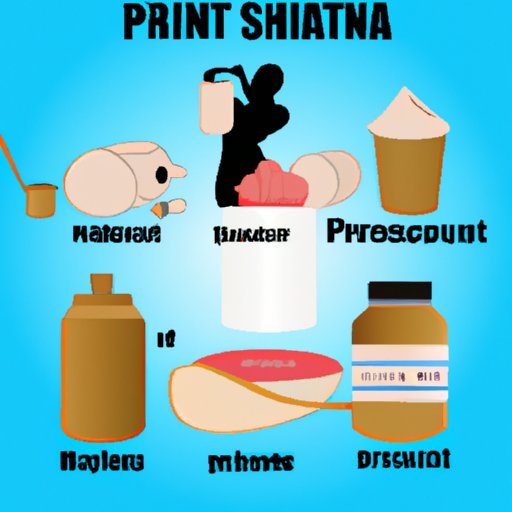Introduction
Proteins are a type of macronutrient, along with carbohydrates and fats, which are essential for the body to function properly. Proteins are composed of amino acids, which are the building blocks of life. They are found in every cell of the body, and play a vital role in many functions such as repairing tissues, forming hormones and enzymes, and regulating metabolism. In order to obtain the necessary proteins for these functions, it is important to consume sufficient amounts of this nutrient from dietary sources.
The benefits of consuming adequate amounts of protein are numerous. Eating a diet rich in protein can promote strong bones and teeth, improve muscle strength, aid in weight loss, and even reduce the risk of certain diseases. Additionally, proteins have been shown to provide long-term health benefits, such as reducing the risk of heart disease, stroke, and diabetes.

Comparing Different Sources of Protein and Their Nutritional Value
There are two main sources of protein: animal-based and plant-based. Animal-based proteins include eggs, dairy products, meats, fish, and poultry. These types of proteins are considered “complete” proteins, meaning they contain all the essential amino acids that the body needs. Plant-based proteins include legumes, nuts, and seeds. These types of proteins are usually “incomplete” proteins, meaning they lack one or more of the essential amino acids.
In terms of their nutritional value, animal-based proteins tend to be higher in fat and cholesterol than plant-based proteins, while plant-based proteins are typically higher in fiber and lower in calories. Additionally, some plant-based proteins, such as legumes, contain additional vitamins and minerals that are beneficial for overall health.
Examining Protein Intake Requirements Across Different Age Groups
The amount of protein required by the body varies depending on age, gender, and activity level. Infants and toddlers need about 10–20 grams of protein per day, while children and adolescents require between 20–30 grams per day. Adults should aim for around 0.8–1.0 grams of protein per kilogram of bodyweight per day, while seniors may need more protein due to muscle loss associated with aging.

Investigating the Role of Protein in Weight Loss and Management
Eating a diet high in protein has been linked to weight loss and management. A recent study published in the Journal of Nutrition found that increasing protein intake while following a calorie-restricted diet can lead to greater weight loss than simply cutting calories alone. This is because protein helps to boost metabolism and increase satiety, or the feeling of fullness after a meal.
Additionally, research suggests that eating a high-protein diet can help to reduce calorie consumption. A study published in the American Journal of Clinical Nutrition found that people who ate a high-protein breakfast consumed fewer calories throughout the day compared to those who ate a low-protein breakfast.

Analyzing the Impact of Protein on Muscle Building and Athletic Performance
Protein is essential for muscle building and athletic performance. When a person exercises, the muscles break down and need to be repaired. Protein helps to facilitate this process by providing the body with the necessary amino acids to rebuild and repair the muscles. Studies have shown that consuming a diet high in protein can help to increase muscle strength, improve recovery time, and enhance athletic performance.
In addition, research suggests that protein can help to reduce muscle soreness and fatigue after exercise. A study published in the International Journal of Sport Nutrition and Exercise Metabolism found that athletes who consumed a high-protein diet experienced less muscle damage and improved performance compared to those who consumed a lower-protein diet.
Conclusion
Protein is an essential macronutrient that plays a key role in maintaining optimal health. Eating a diet rich in protein can provide numerous benefits, such as improved muscle strength, increased satiety, reduced calorie consumption, and faster recovery times. Additionally, protein can help to promote weight loss and reduce the risk of certain diseases. In order to get the most benefit from protein, it is important to consume the right amount for your age, gender, and activity level.
Overall, protein is an important nutrient that can provide many health benefits when consumed in the right amounts. By incorporating quality sources of protein into your diet, you can ensure that your body has the tools it needs to stay healthy and perform at its best.
(Note: Is this article not meeting your expectations? Do you have knowledge or insights to share? Unlock new opportunities and expand your reach by joining our authors team. Click Registration to join us and share your expertise with our readers.)
